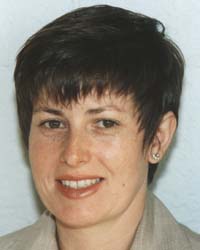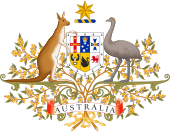
A quorum is the minimum number of members of a group necessary to constitute the group at a meeting. In a deliberative assembly, a quorum is necessary to conduct the business of that group. According to Robert's Rules of Order Newly Revised, the "requirement for a quorum is protection against totally unrepresentative action in the name of the body by an unduly small number of persons." In contrast, a plenum is a meeting of the full body. A body, or a meeting or vote of it, is quorate if a quorum is present.

The speaker of the House of Representatives is the presiding officer of the Australian House of Representatives, the lower chamber within the Parliament of Australia. The counterpart in the upper house is the president of the Senate. The office of the speakership was established in 1901 by section 35 of the Constitution of Australia. The primary responsibilities of the office is to oversee house debates, determine which members may speak, maintain order and the parliamentary and ministerial codes of conduct during sessions and uphold all rules and standing orders. The current speaker of the House of Representatives is Milton Dick, who was elected on 26 July 2022.

The president of the Senate is the presiding officer of the Australian Senate, the upper house of the Parliament of Australia. The counterpart in the lower house is the speaker of the House of Representatives. The office of the presidency of the senate was established in 1901 by section 17 of the Constitution of Australia. The primary responsibilities of the office is to oversee senate debates, determine which senators may speak, maintain order and the parliamentary code of conduct during sessions and uphold all rules and orders of the senate. The current president is Sue Lines, who was elected on 26 July 2022.

The House of Representatives is the sole chamber of the New Zealand Parliament. The House passes laws, provides ministers to form Cabinet, and supervises the work of government. It is also responsible for adopting the state's budgets and approving the state's accounts.

Anna Elizabeth Burke is an Australian former politician and Speaker of the Australian House of Representatives. She is a current Member of the Administrative Appeals Tribunal and an Officer of the Order of Australia. Burke was a member of the Australian House of Representatives from 1998 to 2016, representing the Division of Chisholm in Victoria for the Australian Labor Party. From 2012 to 2013, she was Speaker of the Australian House of Representatives. She was the second woman to become Speaker.

The Jatiya Sangsad, often simply referred to as Sangsad and also known as the House of the Nation, is the supreme legislative body of Bangladesh. The current parliament of Bangladesh contains 350 seats, including 50 seats reserved exclusively for women. Elected occupants are called members of Parliament, or MPs. The 11th national parliamentary election was held on 30 December 2018. Elections to the body are held every five years, unless a parliament is dissolved earlier by the president of Bangladesh.
The Cabinet of Australia, also known as the Federal Cabinet, is the chief decision-making body of the executive branch of the federal government of Australia. The cabinet is appointed by the prime minister of Australia and is composed of senior government ministers who head the executive departments and ministries of the federal government, this often includes assistant ministers and a number of special envoys and other government advisors. The cabinet is separate to the federal Department of the Prime Ministers and Cabinet.

In the United Kingdom, the Chairman of Ways and Means is a senior member of the House of Commons who acts as one of the Speaker's three deputies. The incumbent is Dame Eleanor Laing, MP for Epping Forest, who was first elected to the office on 8 January 2020.
A committee of the whole is a meeting of a legislative or deliberative assembly using procedural rules that are based on those of a committee, except that in this case the committee includes all members of the assembly. As with other (standing) committees, the activities of a committee of the whole are limited to considering and making recommendations on matters that the assembly has referred to it; it cannot take up other matters or vote directly on the assembly's business. The purpose of a committee of the whole is to relax the usual limits on debate, allowing a more open exchange of views without the urgency of a final vote. Debates in a committee of the whole may be recorded but are often excluded from the assembly's minutes. After debating, the committee submits its conclusions to the assembly and business continues according to the normal rules.

The Sabah State Legislative Assembly is a part of the legislature of Sabah, Malaysia, the other being the governor of Sabah. The assembly meets at the Sabah State Legislative Assembly Building at Likas in the state capital of Kota Kinabalu.

Party leaders of the United States House of Representatives, also known as floor leaders, are congresspeople who coordinate legislative initiatives and serve as the chief spokespersons for their parties on the House floor. These leaders are elected every two years in secret balloting of their party caucuses or conferences: the House Democratic Caucus and the House Republican Conference. Depending on which party is in power, one party leader serves as majority leader and the other as minority leader.
The Public Accounts Committee (PAC) is a standing committee of Dáil Éireann, the lower house of the Irish Parliament. It oversees government expenditures to ensure they are effective and honest. It is responsible for examining reports of Comptroller and Auditor General on Departmental expenditure and certain other accounts. It also considers the Comptroller and Auditor General's reports of economy, efficiency, effectiveness evaluation systems, procedures and practices. The PAC has a key role to play in ensuring accountability and transparency in the way Government agencies allocate, spend and manage their finances and in guaranteeing that the taxpayer receives value for money for every euro spent. By the nature of its role as the public spending watchdog, the Committee of Public Accounts is one of the most powerful Oireachtas Committees.
Christina Gray is a Canadian politician. She is a Member of the Legislative Assembly of Alberta. First elected in 2015 as the member representing Edmonton-Mill Woods, she was re-elected in 2019 and 2023.

Committees of the New Zealand House of Representatives are subsets of the New Zealand House of Representatives which deal with specific tasks delegated to them by the House. The functions of committees include scrutinising draft legislation (bills), conducting inquiries into subjects within their expertise, receiving public comment on matters before them, and overseeing the operation of the public service.

The Standing Committee on Procedure is a committee of the Australian House of Representatives responsible for the practices and procedures of the House of Representatives and its committees. The committee is governed by Standing Order 221 and consists of seven members, four government members and three non-government members. The chair is appointed by the Prime Minister and the deputy chair by the Leader of the Opposition under Standing Order 232.

The Standing Committee on Petitions is a committee of the Australian House of Representatives responsible for the processing of petitions addressed to the House of Representatives. The committee is governed by Standing Order 220 and consists of eight members, five government members and three non-government members. The chair is appointed by the Prime Minister and the deputy chair by the Leader of the Opposition under Standing Order 232.

The Standing Committee on Appropriations and Administration is a committee of the Australian House of Representatives responsible for the funding and operations of the House of Representatives. The committee is governed by Standing Order 222A and consists of nine members, the Speaker as chair, ex officio, four government members and three non-government members. The deputy chair is appointed by the Leader of the Opposition under Standing Order 232.

The Standing Committee on Publications, also called the Publications Committee, is a committee of the Australian House of Representatives responsible for the consideration of documents presented to the House of Representatives. The committee is governed by Standing Order 219 and consists of seven members, four government members and three non-government members. The chair is appointed by the Prime Minister and the deputy chair by the Leader of the Opposition under Standing Order 232. The Committee usually meets together with its Senate counterpart, and together form the Joint Parliamentary Committee on Publications.

The Selection Committee is a committee of the Australian House of Representatives responsible for determining the progam of private members business in the House of Representatives. The committee is governed by Standing Order 222 and consists of fourteen members, eight government members and six non-government members. The Speaker is chair of the committee ex officio. The Deputy Speaker can substitute for the Speaker in his absence.

The Standing Committee on Agriculture is a committee of the Australian House of Representatives. The committee is a "General Purpose Standing Committee" governed by Standing Order 215. It consists of nine members, five government members and four non-government members. The chair is appointed by the Prime Minister and the deputy chair by the Leader of the Opposition under Standing Order 232.










